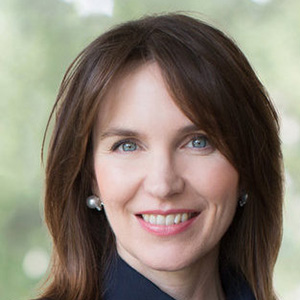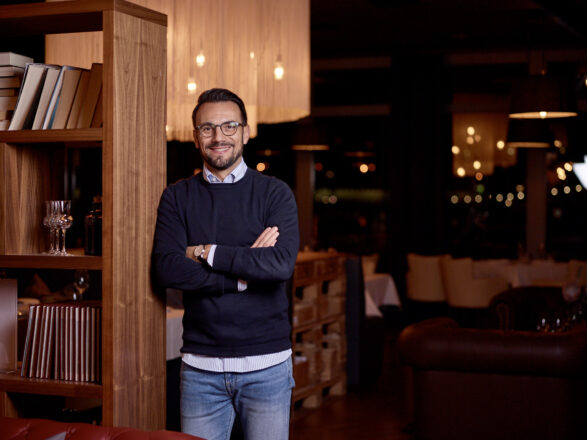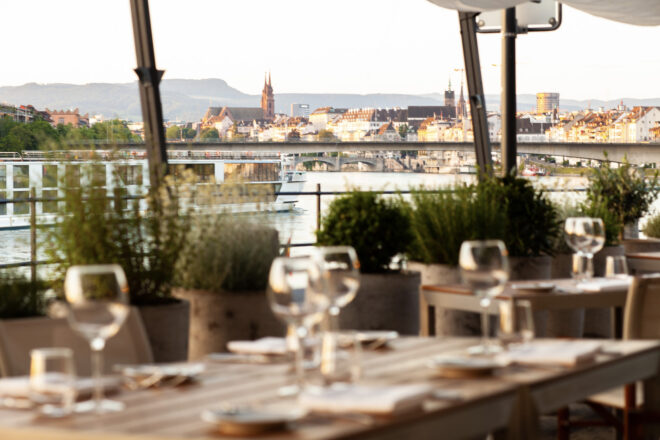





Name: Dragan Rapic
Nationality: Swiss
Year Graduated: 2017 (EMBA 49)
Current Organization: EventArena GmbH (Restaurant „roots“ und Eventlocation „Rhypark“)
Current Role: Managing Director
 Tell us more about your background. What were you doing prior to embarking on the Executive MBA HSG?
Tell us more about your background. What were you doing prior to embarking on the Executive MBA HSG?
Originally, I come from the sports industry and have worked as the Head of Sport for the Grasshopper Club Zurich in which I won the Swiss Cup in 2013 and became vice champion twice in a row. Prior to that, I worked for FC Basel 1893 and UEFA (Euro 2008 SA). In March 2017, I opened the restaurant called “roots” in Basel. It was almost at the same time as I graduated from the Executive MBA HSG in Spring 2017 (EMBA Cohort 49).
How did you and your company experience the lockdown? What has changed for you and your employees during the lockdown?
Personally, I have experienced the entire lockdown (from the implementation of measures and until easing of measures) with mixed feelings if I may be honest. For the company, it was nothing more than a radical brake: a “full stop”! We had to go from “200 to 0” from one moment to the next. As we have also implemented events to a large extent in addition to top-class gastronomy, both sectors that have been (and unfortunately still are) massively affected. The main changes for my employees have been the workload, their capacity utilization and work rhythm, as home office is not possible in our case.
Have new business models developed during this time? How have you adapted your existing business?
Yes, we have created our own take-away business called “rootilicious box”. However, we have only offered this new business model on selected days (Easter, May 1 and Mother’s Day) and have sold out every time. This success has proven us right with our chosen strategy and thanks to the positive feedback, we will continue to develop, build and implement the “rootilicious box” after the lockdown.
With the “roots”, we have decided to gradually bring back the restaurant to normal operation. In concrete terms, this means that we will initially only be open from Thursday to Saturday in the evening. The lunch business will not be profitable yet due to the current home office working environment. As far as events are concerned, the situation is much more precarious, as all events have been cancelled and a timely return to normality is not foreseeable — even though events with up to 300 people are again possible. A really difficult circumstance.
Now, since 11 May, many catering businesses have reopened (with numerous restrictions). What has been the response from employees and customers since the partial start?
My team was primarily looking forward to resuming work after the almost two-month compulsory break. And with our guests, we feel the desire to indulge in fine culinary experience by the “roots” and our chef, Pascal Steffen. The interest in spending an evening with us guarantees gratification. Our guests are surprised how subtly we have succeeded in implementing the measures. We are pleased by this because we believe it is important that the guests find the familiar ambience and that we give them back a bit of normality.
 What are you personally taking with you from this time of crisis? What would you give executives from the catering and event sector as a tip/advice?
What are you personally taking with you from this time of crisis? What would you give executives from the catering and event sector as a tip/advice?
“Gouverner, c’est prévoir” — a principle that has always accompanied me up to now and has helped me in this time of crisis to think concretely about the different scenarios in advance so that I don’t lose any time for my decisions, steps and measures. I admit that it is a rather time-consuming undertaking because of the constantly changing requirements and the variety of information. In addition, during the crisis, it was really valuable to see which of the employees (also suppliers, partners, clients, etc.) understood the situation — who would follow along and who would not.
Examining one’s operation on a daily basis is not actually advisable even though, it is a priority and makes sense from an economic perspective. However, it is indispensable especially in the coming months, as the most difficult time is just around the corner! In addition to these obvious “hard skills”, I think it is important that a manager not only remains authentic and transparent in a time of crisis, but also does not lose sight of his social responsibility for his employees and demonstrates what he is saying even more consciously than usual, with a sense of solidarity. After all, the employees are also watching the manager closely.
 EMBA HSG Impact, News
EMBA HSG Impact, News
 EMBA HSG Impact
EMBA HSG Impact
Do you have any questions or require further information? We will be happy to help.